#Circuit-Guv’nor
Explore tagged Tumblr posts
Text
Circuit-Guv’nor – Inspector Spacetime
Within the rigid Circuit-Chap social strata, Circuit-Gov'nors answered only to the Circuit-King. In the field, Circuit-Gov'nors commanded the factory-flagships which led the Circuit-Army's Digifleets. A Circuit-Gov'nor would serve as a regulator of the Circuit-Soldiers in the Circuit-King's absence and sometimes be accompanied and assisted by a Circuit-Butler. ("Five Inspectors, One Time Booth")
Most Circuit-Gov'nors were recognisable as leader by a tweed flat cap ("Reappearance of the Circuit-Chaps") or steel-wool handlebar moustaches ("Ennui of the Circuit-Chaps"). The rotory shaft–driven A. I. Varistor-Jones, a proto-Circuit-Chap, had a silver handlebar moustache and was addressed as "gov'nor" by his Circuit-Mutts ("'ello, guv'nor!", "blimey, guv'nor!", "lumme, guv'nor!", etc.). ("Alan Turing’s Test of Horror", "The Descent of the Circuit-Chaps")
4 notes
·
View notes
Text
Marshall Guv`nor: a Pedal that sounds like a Tube Stack
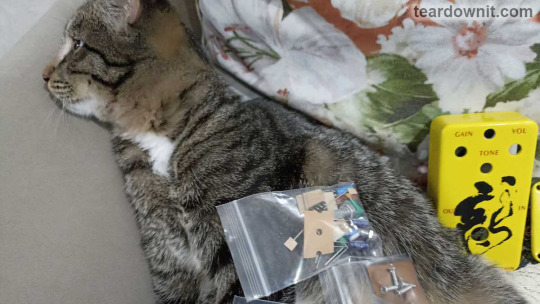
To be more accurate, it sounds like a valve stack; after all, it is a British pedal imitating British Marshall amplifiers.

Don't tell anyone because it's a secret: when creating his JTM45, Jim Marshall actually copied the circuitry of a 1959 Fender Tweed Bassman 5F6-A.
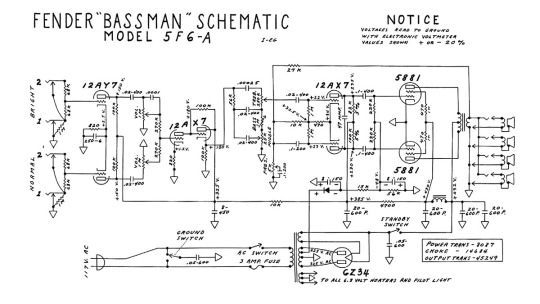
And Mr. Marshall also equipped his first 50-watt combo amplifier, a 1961 JMP Tremolo “Bluesbreaker,” with four 10-inch speakers. The iconic 2x12" version was made a year later.
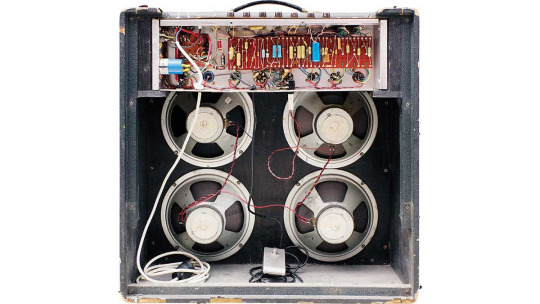
Tolex instead of tweed, a horizontal arrangement of tubes, and ring-shaped loudspeaker magnets—the differences end there.
But why does the British Marshall sound so different from the American Fender? Is the difference really just the Celestion speakers instead of the Jenhsen ones with their U-shaped magnetic core?
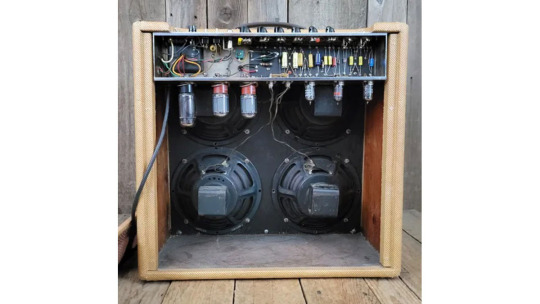
The stronger magnetic field of British loudspeakers compresses the sound's dynamic range to a significant extent. One can compare the waveforms recorded with the Shure SM57 microphone from the 12" Celestion G12M Greenback and Fender Mustang II (V1) loudspeakers, as well as from the 8" Orange Voice of the World PPC108.
But the spiciest part of the Marshall sound is literally based on the usage of British valves instead of American tubes.

In the post about a simple DIY tube guitar amplifier, we already noted that the sound of a particular tube depends on the geometry of the grids and anode.
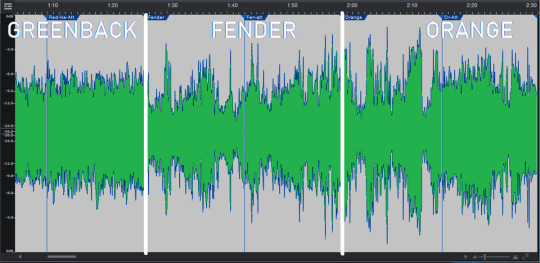
And if we compare 12AX7 preamp tubes with ECC83, we will see and hear that they are all very different. This is determined not by an American or European stamp but by the design of this particular unit from a particular manufacturer.
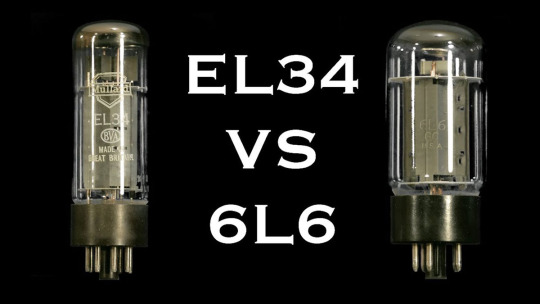
It's a completely different story with the EL34 and 6L6 power amplification output tubes. Their sound difference is on another level. Short and thick American 6L6 can be described as high fidelity with a large headroom; long and thin English EL34 is, on the contrary, a growling and roaring powerhouse due to the fact that it tends to limit and distort the signal.
Does this mean that if you swap the speakers and tubes in the Tweed Bassman and Bluesbreaker combos, the Fender 5F6-A would become a Marshall JTM45? Not really, no.
In the universe of guitar amplification, nuances matter: the cabinet's open or closed back wall, the fine selection of component values, and the frequencies to which the tone controls are set.
And, of course, the sound is influenced by the anode supply rectifiers and the supply and output transformers. And according to some experts, even the material of the chassis matters: the windings of transformers have considerable leakage inductance, and their alternating magnetic field interacts with the metal of the chassis.
Then there's another question: is it possible to emulate all these effects without real tubes, bulky loudspeakers, and heavy multi-pound transformers? A guitar amplifier is a complex yet still measurable device; it's subject to the laws of physics and can be mathematically evaluated.
There is no doubt about the possibility of recreating a certain sound by other means. The question is how complex the circuit with transistors and ICs will be sufficient to obtain a convincing effect.
The idea to replicate the iconic sound of the Marshall JTM 45 and JCM800 in a pedal body and create the world's first amp-in-a-box, oddly enough, first came to none other than the employees of the Marshall company itself, led by the head of the Development Department, Steve Grindrod.
Guitarists worldwide owe a debt of gratitude to this man for developing the legendary Marshall JCM800 and Vox AC30.
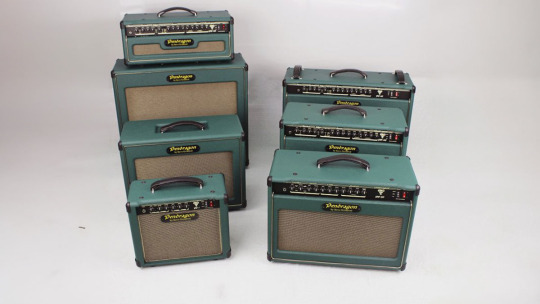
Today, the godfather of British Sound owns his company, Steve Grindrod (Albion) Amplification. He produces Pendragon guitar amps and Gypsy Boy acoustic amps and works with various charities. And in 1988, his efforts led to the creation of the Guv’nor pedal.
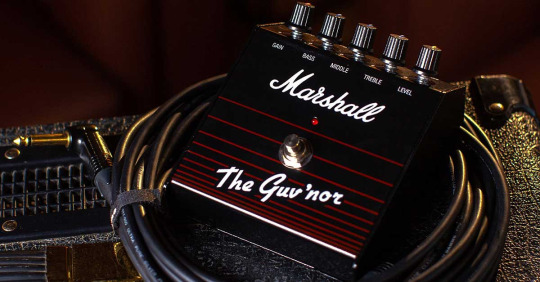
In 1992, the pedal was re-released under the name Drive Master. It differed from the original only without an effects loop jack.
The circuit looks like a regular distortion pedal with two operational amplifiers. The first is included as a non-inverting amplifier; the signal is supplied to the non-inverting input. And the second operational amplifier is used in the inverting connection.
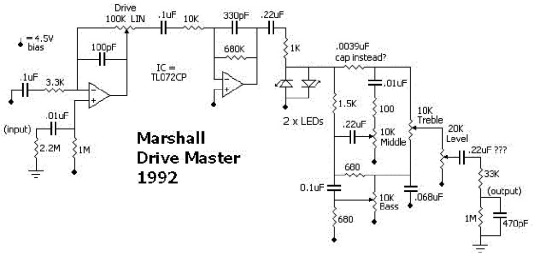
The drive regulator potentiometer is configured to control the negative feedback of both op-amps. This is a brilliant design by Steve Grindrod.

By comparison, Orange tube and transistor amplifiers typically use dual, linked potentiometers to control the gain of the two stages simultaneously.

Red LEDs are used as limiting elements in this Marshall amp-in-a-box. This makes it possible to adjust overdrive and compression using the drive knob in a wider range and get a sound from light blues overdrive to hard heavy metal distortion.
And, of course, the standout feature of this pedal is the gorgeous three-way tone stack, tuned for that signature Marshall sound. It has even more components than the tone stacks of many other tube amps.
This happens because the pedal does not have as many gain stages, each with timbre-shaping frequency-dependent circuits, as a large amplifier does. The tone stack has more work to do in the pedal than in the amp head or combo. At least, that's what Steve Grindrod thought when developing The Guv'nor.

However, in 1992, when developing the Blues Breaker pedal, it turned out that the distortion sounded great with just one tone knob, a simple treble-bleed circuit.
Three new pedals were developed. Drive Master was a reissue of The Guv'nor. Blues Breaker featured soft clipping and lower gain.
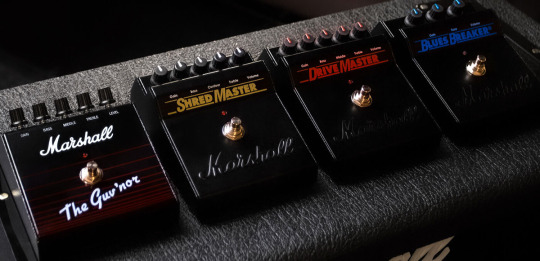
The Shred Master, on the other hand, was a pedal with maximum gain and a Contour knob, which allowed to emphasize the mids for a vintage sound or, alternatively, make a mid scoop and get a modern sound.
As any successful pedal deserves, The Guv’nor was soon copied by other manufacturers: Daddy O from Danelectro, Crunch Box from MI Audio, Riot from Suhr, and Angry Charlie from JHS.
Different versions of these pedals may have a three-way tone stack or a single-tone knob, a switch or presence control in the form of a knob or trim pot inside the body, and a limiting diode switch that sets the compression depth.

The version I put together has four knobs: gain, volume, tone, and presence. I enjoy how this pedal sounds with different guitars. In the video, I play a 2011 Gibson MM Explorer.
youtube
Suppose you want to add Marshall-style voicing to your rig and get some bright British crunch. In that case, you should consider purchasing or building one of the pedals based on the Marshall Guv`nor circuit.
0 notes
Text
Angels is Green - a Stargate Atlantis short story

Of course, he had been there before, to that planet they called Earth. He had been there before they returned to his galaxy, those brave few, unaware of the dangers they would wake.
The first time was when he was very young and the small ones had come across him in his time of testing, on the planet where his hive had left him, alone and feral and near the point of starvation, not having had the courage to hunt and to feed. They had taken him to their ship and somehow nourished him and studied him in their detached yet compassionate manner, their huge, inscrutable black eyes blinking with impartial curiosity.
Perhaps they had regarded him as a pet, for he had run wild about their ship, and, perhaps also they had underestimated his intellect, because he had successfully manipulated their technology and managed to beam himself down to the surface of a planet. He had spent a strange day communing with the odd inhabitants. They were definitely human, their skins brown and soft and without the sheen of moisture that protected the skin of wraithkind, but their speech was crude and their manner of living primitive in the extreme. He felt no urge to feed, presumably due to the small ones’ mysterious replenishing of his cells. So he made himself known to the humans and they, having no knowledge that he might be dangerous, played with him happily enough; simple games involving running along the sands of their seaside home and splashing in the waves.
The small grey ones had found him, blinked and twittered at him amiably, behaved in a similarly indulgent manner toward the primitive humans, and taken him back to their ship. They had eventually returned him to the planet where they had found him and at last his hunger had driven him to feed and he had taken his place as a full adult member of the hive.
The second time was much, much more recent, although still long before the lifetime of any of the humans who had repopulated Atlantis.
He had found an Ancient ship. He had made it work. He had travelled. And, the ship’s hyperdrive having, at best, one or two journeys left in its decaying circuits, he had searched the database and found that far off planet of his youth. That it was in a different galaxy had surprised him, but, not one to brook a challenge, he had directed the ship to take him there, had landed undetected, in a remote spot, and set out to explore.
The humans had advanced. They had tainted the air with the bitter scent of fossil fuels, they had grown in number and clustered into cities of dark and dirty streets that reeked of poverty and disease. They were no longer the simple, playful creatures that he had known, but separated themselves into those who worked long and hard and ate little and those who dressed well and ate much and apparently lived solely to be entertained.
The one that had, soon after joining the hive, been given the name ‘He who goes far’ or ‘He who finds a way’ or simply ‘Wayfarer,’ quickly realised that the overcrowded streets of a huge and often noisome and fog-bound city were excellent feeding grounds and, moreover, that he needed to do very little to blend into such pleasantly gloomy surroundings. All he required was a suit of clothes; an elegant coat or a many-layered cape; a hat such as might be worn by a gentleman of the time, or one who aspired to be a gentleman; and perhaps a tall cane and a handkerchief to complete the ensemble. These things were easily acquired in the usual course of a night’s feeding.
Thus attired, Wayfarer found that he had no difficulty at all in passing for a normal human, because there was such a wonderful variety of what was regarded as normal in this place of transience. There were constant arrivals of tall wooden ships, from which all manner of humans came forth, emanating through scent and taste and mind-sight their tantalising glimpses of desert-heat, ice-cold, jungle-rich, mountain-clear; so many impressions that, strolling among the wooden piers and stagings of the docks, Wayfarer nearly reeled from such life-rich promise.
And, though green skin, a spiracled countenance, pointed teeth and a feeding slit might have set him apart even amid such a myriad of individuals, the fact that disfiguring disease was rife also worked to his advantage. It galled Wayfarer to be thought of as disfigured when his form, amongst his own kind, was considered decidedly pleasing, but expedience was everything in such a situation and he was, after all, glad to be able to hide in plain sight. When glances or outright gasps of horror followed him down a filthy alley, he merely shrugged his shoulders in the manner of the locals and continued on his way.
The city and its great river teemed with life during the day and scarcely less so at night. The humans swarmed the streets along with their animal or hand-drawn conveyances and swarmed the river in their little floating craft, and their business of buying and selling, gossiping and jeering, posturing and posing, living and dying took place in plenitude and abandon wherever and whenever they swarmed. Wayfarer gloried in the abundance.
He loved best the narrow streets where houses overhung their boundaries and light was a rare commodity and he walked freely among them, becoming a familiar figure to the inhabitants, from the children who played amongst the filth to the watchman who tipped his hat warily in the blackest hours of the night.
And Wayfarer observed that even in such poverty and deprivation there was often an undaunted spirit, a camaraderie of squalor, that led cross-shawled women to pass a shared bottle from gap-toothed mouth to wizened, grasping hand while calling out their raucous cries to tempt a passing stranger to the delights of their ravaged bodies. Wayfarer would tip his hat at their earthy humour and greet their mock-refined responses with a hissing acknowledgement, leaving shrieks of alcohol-roughened laughter and broad winks and gestures in his wake.
The men brawling outside the public houses, the women scrubbing their doorsteps in a vain attempt to stave off the tide of dirt, all lived and laboured in common hardship, their solidarity as thick in the air as the blanketing fog.
But when that great, grey swathe slid up from the broad bends of the river and covered the city, sometimes for days at a time, there were dark deeds done in its choking miasma by those minds pushed too hard by the cruelties of life. Wayfarer’s subtle stealth had no need of the fog’s heavy, grey cloak but he found himself venturing forth from his comfortable lodging more frequently than usual, prowling the alleys where hurried footsteps echoed over the damp cobbles, where yellow gas lamps barely penetrated the gloom. Scents hung on the air, trailing behind tattered threads of mind-sight; scents of hunger and grief, lust and passion, fear and pursuit, and the sharp bitter tang of sudden, slashing violence. He followed the dreadful spoor and rid the city of those who would prey on their own kind, those who would kill not for the gain of a few coins or trinkets that might feed themselves or their family, but for the bloody joy of the taking of life, the perverted ecstasy that hung in the air around their slain victims as thickly as the enveloping fog. Such distorted figures of humanity found themselves the victims and were taken and given swift judgement.
It snowed and those without shelter died and the little barefooted children called out to Wayfarer in their hoarse voices, by turns false with bravado and then coaxing with a deep and true hunger. Sometimes he would flick them a coin or two, because, he told himself, perhaps he would have need of their lives when his own hunger was great.
And once, strolling, cane in hand, down a dark, filthy alley, he was presented with an opportunity; an easy kill, a small morsel to stave off his growing need until nighttime presented greater opportunities.
The snow lay dirty and grey, the cobbles slick with grease and wet filth, and a scattered flock of bony, ragged children hurtled by, surrounding Wayfarer briefly, darting beneath his cane like silver fish. One fell, but the others, swifter, had passed on and did not heed their fallen hive-mate. The child picked himself up slowly, cursing like the man he would almost certainly never become; damning the snow and the cold and above all, condemning his own infirmity. Wayfarer observed as the boy picked up a bent stick, padded at one end with a wrapping of rags. He fitted it under his arm and leant heavily, his breath rasping in and out, releasing the vapour of his diseased lungs into the freezing air. The child would surely not last the winter. And yet his small life force might serve as a piquant appetizer to the night’s pleasure.
The boy raised red-rimmed eyes in a pale, gaunt face. “Spare a penny guv’nor?”
Wayfarer rotated the cane in his long fingers, as if to screw it between the cobbles. His feeding hand itched.
“Spare a ha’penny? A farthing? For Christmas, guv’nor? For the little babby Jesus?” The child’s voice was stronger than his emaciated frame, the curl of his lips a valiant attempt at winning humour.
“I will spare you what I have if you approach.”
The boy pulled himself up straight and contrived to fold his arms across his narrow chest while retaining a grip on the crutch. “What’s your game, then, Mister? I ain’t got nuffin for the likes o’ you to be a-thieving.”
“I am no thief. I am merely curious and my sight is poor. I would see the face of the one on whom I would bestow a gift.” Fingers of fog crept up the alley, carrying with them the scent of the river and the stench of the tanneries.
The boy tipped his tattered cap further back on his head and looked directly into Wayfarer’s eyes. “If you ask me, it’s a good thing you don’t see so well, with a phiz like that. I bet you’d crack a mirror.”
Wayfarer added his hissing laugh to the boy’s rasping bray, not grudging the child his crude jest. He held out his hand, his fingers crooked. “Come.” He let a faint imperative drift forth from his mind.
“Alright then, I ain’t afeard.” The boy’s scent belied his words, but he thrust out his chest, took a firm grip on his crutch and hobbled boldly forward.
His cry, as Wayfarer’s fingers grasped the front of his ragged jacket, was easily stifled by a quick suppressing touch of the wraith’s mind. Wayfarer tore the thin shirt open, adjusted his grip and applied his feeding hand over the bony ridge of the child’s sternum, enfolding the small, limp form within the wings of his cape. It was, after all, daylight, even though it would be easy to stir ghosts within the fog to mislead any passers by.
The child began to struggle as the barbs penetrated his flesh, but his feeble attempts were no challenge, nor even a minor inconvenience to Wayfarer. Then the struggles ceased. The wraith sighed, a long, sibilant sigh of satisfaction.
He set the small body down on the cobbles, opened his cape wide, like a set of double doors and stepped back.
The child shuddered once all over and then was still.
And then the boy’s wondering eyes travelled from his dirty, bare feet, planted squarely amid the grey slush, up over his two healthy legs, and his lungs expanded and contracted smoothly, without a whisper of a rasp. His chin tipped back so that his round-cheeked, glowing face mirrored the wraith’s in a strange symmetry and his mouth fell open, the breaths in his newly-healed lungs coming quick and urgent.
Would he speak? Would he thank his saviour? Would he scream in primitive incomprehension?
“I reckon the vicar got it wrong,” he said.
Wayfarer, who would later be called Todd, raised an eyebrow.
“All wrong,” whispered the child.
“How so?”
The boy swallowed, licked his lips and took a step back. “‘Cos they ain’t white and shining with big fevvery wings.” He shook his head, a smile slowly forming. “Angels is green.”
He spun around on his strong legs and jumped in the air, a young, wild human animal full of life and joy. Then he ran, whooping and laughing, stumbling and righting himself, born a cripple and suddenly with a healthy unfamiliar body.
The fog swirled and the boy was gone.
Wayfarer examined his thoughts. Why had he spared the child? Why did he take only those who made victims of their own kind? Why, also, did he linger here, far, far from hive-mind and queen and home?
Perhaps he would not stay much longer. Perhaps he would return to that Ancient hulk, coax it to one more journey through the vast emptiness and then destroy it and all it contained.
And this place would remain, for these humans to grow and progress as they would, to fight amongst themselves with no great enemy from the stars, to develop and perhaps one day to strike out into the stars themselves.
The fog thickened and darkened and figures moved within, both real and phantom. Footsteps and the tap of a cane echoed off the high walls and fluttered like shadows of sound, slowly diminishing into the gloom.
And a few of those short human lifetimes later, as the sun’s rays touched the far side of that world they called Earth, Wayfarer was there again to see a sweeping bridge golden in the dawn light and a great bay lined with dwellings and industry. He recalled the boy who had named him angel and his feeding hand itched to deal out summary judgement. Because here, there were lives; many, many lives and some of those with black hearts whose minds declared their blackness to his questing tendrils of thought. And perhaps there would be just a few, a very fortunate few, who would earn this green angel’s blessing.
Thanks for reading! Find more of my stories on fanfiction.net or AO3.
https://m.fanfiction.net/u/11112812/Salchat
https://archiveofourown.org/users/Salchat
#stargate atlantis#stargate atlantis fanfic#fanfic#fanart#todd the wraith#Wraith#short story#victorian london#backstory#happy ending#sga
16 notes
·
View notes